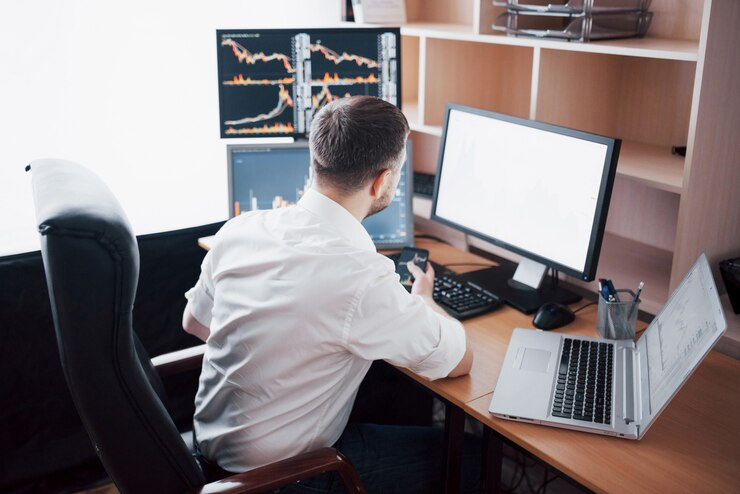Comments
- No comments found

Do you want to wager that the British Pound will fall after a BREXIT-related event?
The USD/GBP pair will then need to be traded. With an average daily turnover of almost $7.5 trillion, the Forex market is the largest and most liquid market in the world, containing every currency in the world.
It will need an online broker to have access to this market. You must comprehend how brokers operate and, most all, how they may assist you to choose the best one with whom to trade.
Every broker is unique and has advantages and disadvantages of their own. While some Forex brokers may concentrate more on providing excellent customer service or having minimal costs, others could provide more sophisticated tools and resources. It will be simpler for you to focus your search if you know your investment style and the areas in which you would want your broker to excel.
Of course, there are other aspects to consider while looking for your perfect broker; for example, various nations have tighter rules, and the sector is subject to different regulations.
A financial service provider that assists in buying and selling currency is known as a Forex broker. They serve as a go-between for their customers, who may be individuals or companies and the interbank. Financial institutions are connected via a global network known as the interbank or interbank market. Through this network, banks may interact and conduct cross-border transactions in addition to trading currencies.
Regulatory organizations oversee the Forex market, and brokers must abide by the rules. Additionally, they conduct frequent audits to ensure their transactions are ethical, legal, and compliant.
The foreign exchange market is governed by many global organizations rather than a single government agency. It may be necessary for a single broker or brokerage to abide by local, state, and federal laws simultaneously. In addition, certain regulations apply according to the nations where they do business.
A Forex broker's primary function is to provide anybody who desires it access to trade on the intrabank currency market:
Offering trading platforms (terminals) to customers.
Giving them a trading leverage range of 1:2 to 1:5000 on their accounts.
Gathering and preserving information about every transaction a client completes (transaction history).
A real-time online quotation feed for every trading instrument that is accessible.
Offering instructional and informative services related to trading.
Brokers are largely used because they are registered and can trade on international marketplaces. In addition, they have extensive knowledge of foreign exchange.
To purchase or sell items overseas, pay employees and contractors abroad, and receive payments in several currencies (the worldwide FX market is used to exchange over 170 different currencies), and other functions, a company owner may work with a currency broker or brokerage. In this scenario, the broker would support foreign exchange strategies, lower costs, and manage risk to facilitate future global economic development.
An accountant in need of assistance with cross-border financial processes would come next. After hearing about the company's objectives, the broker would advise on the best course of action for their particular industry.
If investors are interested in purchasing expensive goods from foreign nations, they may utilize Forex brokerages. These things might be houses, boats, automobiles, etc. In their large-scale, cross-border activities, a Forex broker may assist lower the cost of foreign exchange transactions and improve their security.
There are many more applications, but the main one is for any person or company that has to trade in many currencies on a regular basis or in bulk. In any foreign transaction, brokers are essential suppliers.

Even while all Forex brokers provide currency trading, there are a few things that distinguish them. Adherence to regulations is crucial as it signifies the dependability of the broker and the safety of your capital. Your trading efficiency and experience may be significantly impacted by the trading platform's functionality, speed of execution, and feature set.
Spreads and fees are examples of trading expenses that differ across brokers and have an impact on the total profitability of deals. When it comes to traders in need of help, the caliber of customer care may make a significant difference, particularly in a market that runs around the clock.
Brokers also set themselves apart with the risk management tools they provide, which include take-profit, stop-loss, and negative balance protection. These tools are essential for managing risk in the very unpredictable Forex market. The cost, speed, and ease of deposit and withdrawal choices all influence how trading is experienced overall.
The first thing to consider is if a broker is fully licensed and permitted to operate on the Forex market. If not, this is the first thing to look out for.
It would therefore be prudent to ascertain the length of time a broker has been active in the market.
Forex organizations with a lengthy history in the market are the ones to choose. It doesn't follow that every brokerage firm that just entered the market is inherently harmful. Because there is fierce rivalry in the market, no one can predict whether a highly promising and prospective "novice" would succeed or fail in the future.
Examining evaluations of a business might be beneficial as well. One may find a plethora of independent sites on the Internet that discuss other traders' experiences working with a certain Forex broker.
The next steps include carefully reading the conditions of the service provided, comparing commissions and spreads, and reviewing lists of possible instruments and their characteristics. Work conditions might range greatly amongst firms. For instance, some brokers provide set spreads regardless of the state of the market. Whether something is good or negative is up to the trader.
Learn about the extra services that a broker may provide, such trading signals, text and video support, daily analytics, and one-on-one training.
Find out what options a Forex firm has for depositing and withdrawing money. In cooperative disputes, a trader may sometimes make a strong case for limitations on transactions, request processing speed, and payment methods.

Scams involving Forex brokers include thieves posing as established businesses in order to defraud investors of their money.
Typically, they replicate the name, contact information, and registration number of a licensed Forex broker. Some even make exact replicas of websites to deceive investors into giving them money.
If you want to be sure a Forex broker is approved by the FCA, it's always a good idea to check the FCA registration. They could be a scam broker if they are not on the list. It is customary for corporations to use the same data but different contact numbers, therefore if you get in touch with any organization, always use the number provided in the register.
The FCA also maintains a list of unapproved companies to stay away from. Thus, before making an investment, be careful to see whether a broker is listed.
If you are unsure about a Forex broker, you may report any unlicensed businesses to the FCA and inquire about the legitimacy of the organization.
An essential companion on the currency trading adventure is a Forex broker. They provide traders access to the tools, resources, and assistance they need to trade on the international Forex market. Comprehending the functions and obligations of a Forex broker, as well as the standards for selecting an appropriate one, is essential for proficiently managing the trading environment. In the fast-paced world of Forex trading, traders may increase their chances of success by making well-informed judgments.
Leave your comments
Post comment as a guest